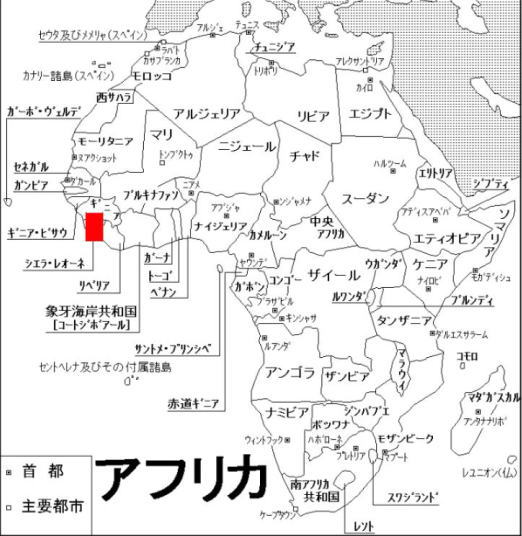■国名:シエラレオネ共和国 Republic of Sierra Leone 
面積 71740平方キロメートル
人口 約600万人
首都 フリータウン
民族 メンデ族、テムネ族、リンバ族、フレオール(黒人と白人の混血)
言語 英語(公用語)メンデ語、テムネ語
宗教 イスラム教(60%)キリスト教(10%)アニミズム宗教(30%)
産業 鉱業(ダイヤモンド)、農業(コーヒー、ココア)
所得 1人当たりのCNI 320ドル(2008年)
在留日本人数 18人(2009年 10月現在
大使館 日本公館 ガーナ大使館が兼轄 シエラレオネ公館 在中国大使館が兼轄
内政 シエラレオネでは、1991年に反政府軍(RUF)が蜂起し、同国で産出されるダイヤモンドを財源に、反政府戦闘が勃発しました。 1997年5月、政府軍下級兵士による軍事クーデターによりカバ大統領はギニアへ脱出。 1999年10月、国連安保理は、政府勢力と反政府勢力の間の和平合意を実施するための「UNAMSIL(国連シエラレオネミッション)」の派遣を決定し DDR計画(元兵士の武装・動員解除、及び社会復帰)が展開されました。ECOWAS諸国の仲介により、2000年11月のシエラレオネ政府とRUFとの間での停戦合意 がなされ、2001年5月には両者間の武装解除の実施方法についての合意がなされる等、状況は平静化しました。 2002年1月18日、カバ大統領は、DDR計画の進捗状況に鑑み、シエラレオネにおける武装解除の完了宣言を行いました。 2007年8月及び9月には、カバ大統領の任期満了に伴い、大統領・議会選挙及び大統領選挙決選投票が平和裡に行われ 、野党全人民議会党(APC)のアーネスト・コロマ氏が新大統領に就任しました。 コロマ大統領は、政権発足時より電力供給を始めとしたインフラ復興、閣僚との年間契約に基づく公共部門改革、汚職撲滅、保健等の諸課題に取組んでいます。 国内の治安は概ね安定しており、内戦復興期から開発期に入りつつあります。
■About Sierra Leone
A chronology of key events
1787 – British abolitionists and philanthropists establish a settlement in Freetown for repatriated and rescued slaves.
1961 – Sierra Leone becomes independent.
1967 – Military coup deposes Premier Siaka Stevens’ government, but he returns to power the following year and becomes president in 1971, after Sierra Leone becomes a republic.
War and Coups
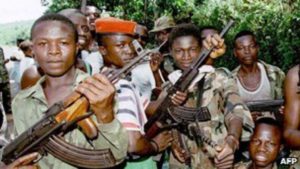 RUF rebels waged a campaign of amputation and rape
RUF rebels waged a campaign of amputation and rape
1991 – Start of civil war. Former army corporal Foday Sankoh and his Revolutionary United Front (RUF) begin campaign against President Momoh, capturing towns on border with Liberia.
1991 September – New constitution providing for a multiparty system adopted.
1992 – President Joseph Momoh ousted in military coup led by Capt Valentine Strasser, apparently frustrated by failure to deal with rebels. Under international pressure, Capt Strasser announces plans for the first multi-party elections since 1967.
1996 January – Valentine Strasser ousted in military coup led by his defence minister, Brig Julius Maada Bio.
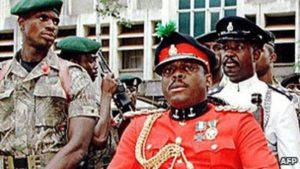
1996 – Ahmad Tejan Kabbah elected president in February, signs peace accord with Sankoh’s rebels in November.
1997 – Peace deal unravels. President Kabbah deposed by army in May. Maj Johnny Paul Koroma, in prison awaiting the outcome of a treason trial, leads the military junta – the Armed Forces Revolutionary Council (AFRC). Koroma suspends the constitution, bans demonstrations and abolishes political parties.
Kabbah flees to Guinea to mobilise international support.
1997 July – The Commonwealth suspends Sierra Leone.
1997 October – The UN Security Council imposes sanctions on Sierra Leone, barring the supply of arms and petroleum products. A British company, Sandline, nonetheless supplies “logistical support”, including rifles, to Kabbah allies.
1998 February – Nigerian-led West African intervention force Ecomog storms Freetown and drives rebels out.
1998 March – Kabbah makes a triumphant return to Freetown amid scenes of public rejoicing.
1999 January – Rebels backing Revolutionary United Front leader Foday Sankoh seize parts of Freetown from Ecomog. After weeks of bitter fighting they are driven out, leaving behind 5,000 dead and a devastated city.
UN intervenes
1999 May – A ceasefire is greeted with cautious optimism in Freetown amid hopes that eight years of civil war may soon be over.
1999 July – Six weeks of talks in the Togolese capital, Lome, result in a peace agreement, under which the rebels receive posts in government and assurances they will not be prosecuted for war crimes.
1999 November/December – UN troops arrive to police the peace agreement – but one rebel leader, Sam Bokari, says they are not welcome. Meanwhile, Ecomog troops are attacked outside Freetown.
2000 April/May – UN forces come under attack in the east of the country, but far worse is in store when first 50, then several hundred UN troops are abducted.
2000 May – Rebels close in on Freetown; 800 British paratroopers sent to Freetown to evacuate British citizens and to help secure the airport for UN peacekeepers; rebel leader Foday Sankoh captured.
2000 August – Eleven British soldiers are taken hostage by a renegade militia group called the West Side Boys.
Disarming rebels
2000 September – British forces mount operation to rescue remaining UK hostages.
2001 January – Government postpones presidential and parliamentary elections – set for February and March – because of continuing insecurity.
2001 March – UN troops for the first time begin to deploy peacefully in rebel-held territory.
2001 May – Disarmament of rebels begins, and British-trained Sierra Leone army starts deploying in rebel-held areas.
2002 January – War declared over. UN mission says disarmament of 45,000 fighters is complete. Government, UN agree to set up war crimes court.
2002 May – Kabbah wins a landslide victory in elections. His Sierra Leone People’s Party secures a majority in parliament.
2002 July – British troops leave Sierra Leone after their two-year mission to help end the civil war.
2003 July – Rebel leader Foday Sankoh dies of natural causes while awaiting trial for war crimes.
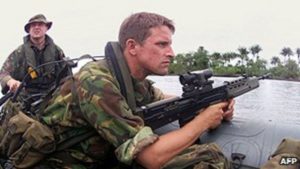 Foreign troops, such as these British soldiers, intervened in the conflict in Sierra Leone
Foreign troops, such as these British soldiers, intervened in the conflict in Sierra Leone
2003 August – President Kabbah tells truth and reconciliation commission that he had no say over operations of pro-government militias during war.
2004 February – Disarmament and rehabilitation of more than 70,000 civil war combatants officially completed.
War crimes trials
2004 June – UN-backed war crimes war crimes trials begin.
2004 September – UN hands control of security in capital over to local forces.
2005 August – UN Security Council authorises opening of a UN assistance mission in Sierra Leone from 2006, to follow departure of peacekeepers in December.
2005 December – The last UN peacekeeping troops leave Sierra Leone, marking the end of a five-year mission to restore order.
2006 March – Liberian ex-president Charles Taylor is arrested in Nigeria and handed over to the war crimes court in Sierra Leone which indicted him.
2006 December – President Kabbah says 90% of the country’s $1.6bn (£815m) debt has been written off after negotiations with international creditors.
Taylor trial
2007 June – Start of former Liberian President Charles Taylor’s war crimes trial in The Hague, where he stands accused of instigating atrocities in Sierra Leone.
Sierra Leone’s special war crimes court in Freetown delivers its first verdicts, finding three militia leaders guilty.
2007 August – Presidential and parliamentary polls. Ernest Bai Koroma wins the presidency and his All People’s Congress, formerly in opposition, wins a majority in parliament.
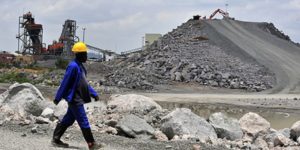 Diamond mining is a major activity in the Kono district, in eastern Sierra Leone
Diamond mining is a major activity in the Kono district, in eastern Sierra Leone
2009 October – UN-backed Special Court winds down after seven years investigating civil war atrocities. Its remaining case, the trial of Charles Taylor, continues in The Hague.
2010 September – UN Security Council lifts last remaining sanctions against Sierra Leone – an arms embargo and a travel ban for rebels.
2012 February – Energy companies report discovery of oil off the coasts of Liberia and Sierra Leone. Work continues to estimate their size.
2012 April – The UN-backed Sierra Leone war crimes court in The Hague concludes its work with the conviction of former Liberian leader Charles Taylor of aiding and abetting war crimes in the Sierra Leone civil war.
2012 November – First elections for since the end of the civil war held without UN oversight. President Koroma wins a second term.
2013 April – Sierra Leone deploys a battalion of troops to Somalia to join the African Union peacekeeping mission.
Ebola epidemic
2014 July – Sierra Leone declares a state of emergency to tackle the deadly Ebola outbreak which has killed more than 700 in West Africa.
2014 August – President Ernest Bai Koroma dismisses Health Minister Miatta Kargbo over her handling of the Ebola epidemic that has killed more than 400 people in Sierra Leone.
2014 September – People in Sierra Leone are instructed to stay indoors for three days, as part of the country’s strategy to stop the spread of the deadly Ebola virus.
2015 March – Vice-President Samuel Sam-Sumana seeks asylum in US embassy, claiming his life is in danger. President Koroma accuses him of fomenting violence, and dismisses him.
2016 March – The World Health Organisation declares Sierra Leone Ebola-free for a second time, after a new flare-up in the wake of the first all-clear in November.
2018 April – Former military Julius Maada Bio ruler wins presidential election as Sierra Leone People’s Party candidate, beating Samura Kamara of the governing All People’s Congress. Mr Kamara says he will mount a legal challenge to the result.
